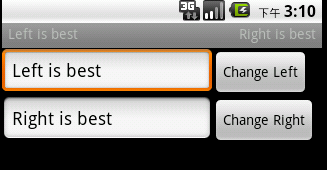- android开发—项目结构设计
LaFerrariLi
android开发结构经验设计移动开发
我作为一名Android开发者也有好几年的经历了,从打杂开始到带领几个人的小团队开发,写过的项目也有很多了,从小到几十个页面的到几百个页面的,也算是积累了一些移动开发的经验了。我在这些年的工作当中发现很多开发者都喜欢把所有的代码,类放在一个项目下,甚至还有人把Adapter放在Activity中,这些做法显然是不好的首先是看起来很不方便,结构很乱,不利于优化和修改,时间长了项目大了之后,迭代简直就
- Android Fresco 框架扩展模块源码深度剖析(四)
&有梦想的咸鱼&
AnddroidFresco原理分析Android开发大全android
一、引言在Android开发领域,图片处理一直是一个重要且具有挑战性的任务。Fresco作为Facebook开源的强大图片加载框架,在图片的加载、缓存和显示等方面已经提供了非常完善的功能。然而,为了满足不同开发者多样化的需求,Fresco设计了丰富的扩展模块,这些扩展模块允许开发者根据自身项目的特点对框架进行定制和扩展。本文将深入剖析Fresco框架的扩展模块,从源码级别进行详细分析,帮助开发者更
- 解锁Android开发利器:MVVM架构_android的mvvm(2),2024年最新kotlin高阶函数
Java图灵架构
2024年程序员学习android架构kotlin
classWeatherViewModel:ViewModel(){privatevalweatherRepository=WeatherRepository()privateval_weather=MutableLiveData()valweather:LiveData=_weatherfunfetchWeather(city:String){valweatherData=weatherRepo
- 探索现代Android开发的杰作:基于Kotlin的MVVM应用
郁楠烈Hubert
探索现代Android开发的杰作:基于Kotlin的MVVM应用kotlin-mvvm-hilt-flow-appKotlinfirstappusingCleanArchitecturewithMVVMpatternalongwithAndroidArchitectureComponentssuchasLiveData,ViewModel,NavigationandidiomaticKotlinu
- Android BaseActivity的设计(一)
小翘学Framework
Android从入门到跑路androidBaseActivityMVC
Android开发中BaseActivity在程序设计对于项目的架构重要性不言而喻,一个好的BaseActivity设计可以让项目的Activity代码看起来更加简洁且易编写,同时BaseActivity也是MVC,MVP和MVVM架构体现。BaseActivity使用场景1多个子类有公有的方法,并且逻辑基本相同时。2重要、复杂的算法,可以把核心算法设计为模板方法,周边的相关细节功能则由各个子类实
- Android开发——蓝牙与外部设备连接
阿饼240
android
一、获取蓝牙权限在Manifest.xml文件中添加蓝牙权限声明二、检查设备是否支持蓝牙BluetoothAdapterdefaultAdapter=BluetoothAdapter.getDefaultAdapter();if(defaultAdapter==null){Toast.makeText(MainActivity.this,"该设备不支持蓝牙",Toast.LENGTH_SHORT)
- Kotlin知识体系(一) : Kotlin的五大基础语法特性
氦客
知识体系-Kotlin基础kotlin开发语言android基础语法特性知识体系
前言在Android开发领域,Kotlin凭借其简洁性和安全性已成为官方推荐语言。本文将通过Kotlin的五大基础语法特性,结合实际应用场景展示它们在Android开发中的独特价值。一、变量声明:val与var的哲学1.1不可变优先原则Kotlin的val关键字用于声明不可变变量(相当于Java的final),这是构建可靠Android应用的基石:valPI=3.14159//类型推断为Doubl
- Kotlin知识体系(二) : Kotlin的七个关键特性
氦客
知识体系-Kotlin基础kotlinandroid开发语言特性密封类dataclass安卓
前言在Android开发中,Kotlin以其简洁的语法和强大的特性显著提升了开发效率。本文将解析Kotlin中7个关键特性,通过代码示例展示它们在实际开发中的应用。一、构造函数:主次分明主构造函数classUserconstructor(_name:String){//传统写法valname=_name}classStudent(valid:Int,varname:String)//简化版主构造函
- kotlin中的行为组件
每次的天空
kotlin开发语言android
在Android开发领域,Jetpack已经成为现代化应用开发的标配。除了界面组件外,其提供的行为组件(BehaviorComponents)更是解决了众多开发痛点。本文将深入解析WorkManager、DataBinding、Coroutines和Lifecycle四大核心组件的工作原理,并结合实战代码展示它们的具体用法。首先要添加jetpack相关的依赖库,操作如下:android{...da
- Android Dagger2 框架作用域管理模块深度剖析(五)
&有梦想的咸鱼&
AndroidDagger2原理android
一、引言在Android开发中,依赖注入(DependencyInjection,简称DI)是一种重要的设计模式,它能有效降低代码之间的耦合度,提升代码的可测试性和可维护性。Dagger2作为一款强大的依赖注入框架,凭借其在编译时生成依赖注入代码的特性,避免了运行时反射带来的性能开销。而作用域管理模块是Dagger2中极为关键的一部分,它能精准控制依赖对象的生命周期,确保在特定作用域内依赖对象的唯
- Android Studio运行错误分析与解决:Caused by: org.codehaus.groovy.control.MultipleCompilationErrorsException: s
LuXi_foryou
androidstudioandroidide
AndroidStudio运行错误分析与解决:常见问题汇总作为一名Android开发者,在使用AndroidStudio时,难免会遇到各种运行错误。今天,我将分享一些常见的错误及其解决方法,帮助大家快速定位问题并修复代码。错误1:org.codehaus.groovy.control.MultipleCompilationErrorsException:startupfailed错误描述在运行或构
- Android文件选择器的优化之旅
t0_54manong
编程问题解决手册android个人开发
在Android开发中,我们经常需要用户从设备中选择文件。最近,我在处理一个项目时遇到了一个有趣的问题:如何限制用户只能选择一个文件,而不是多个。下面我将详细介绍如何实现这个功能,并提供一个实际的例子。问题描述通常,我们使用Intent.ACTION_OPEN_DOCUMENT来启动文件选择器。在默认情况下,这个选择器允许用户选择多个文件,但有时候我们希望用户只能选择一个文件。这不仅可以提高用户体
- Android Dagger2 框架注入模块源码深度剖析(四)
&有梦想的咸鱼&
android
一、引言在Android开发中,依赖注入(DependencyInjection,简称DI)是一种重要的设计模式,它能够有效降低代码之间的耦合度,提高代码的可测试性和可维护性。Dagger2作为一款强大的依赖注入框架,在编译时生成依赖注入代码,避免了运行时反射带来的性能开销。注入模块是Dagger2的核心部分,负责将依赖对象注入到目标对象中。本文将深入分析Dagger2框架的注入模块,从源码级别详
- Android 里SQLite和ROOM框架简单介绍
大林不要掉头发
android数据库
简单的AndroidSQLite使用最简单的SQLite在Android开发中,SQLite是一个轻量级的关系型数据库管理系统,经常用于存储和管理应用程序的数据。如果你刚刚学习Android数据库的使用,你一定要学习SQLite的使用。以下是一个简单的示例,展示了如何在Android应用中创建SQLite数据库、创建表、插入数据以及查询数据。创建SQLite数据库、创建表publicclassDB
- 【android文件存放路径】
tangsilian
androidandroid
Android开发:filePath放在哪个文件夹Environment.getDataDirectory()=/dataEnvironment.getDownloadCacheDirectory()=/cacheEnvironment.getExternalStorageDirectory()=/mnt/sdcardEnvironment.getExternalStoragePublicDire
- Android开发:如何在应用中显示应用名称
t0_54program
编程问题解决手册android个人开发
在Android开发中,应用程序的用户界面(UI)设计是一个关键环节。许多新手开发者在使用AndroidStudio和Java语言创建应用时,可能会遇到一些常见的UI问题。比如,如何在应用的顶部显示应用名称(即标题栏或工具栏)。本文将详细讲解如何在Android应用中正确显示应用名称,并通过一个实际的实例来展示解决方案。问题描述假设你正在开发一个简单的Android应用,该应用可以将公斤(kg)转
- Android高级组件实践:ViewPager详解与案例
Bachnroth
本文还有配套的精品资源,点击获取简介:ViewPager是Android开发中用于页面切换的组件,广泛应用于引导页、图片查看器和Tab布局等。它通过PagerAdapter管理页面,提供页面创建与销毁的方法实现。本篇详细解析了ViewPager的使用方法,包括如何设置Adapter、绑定ViewPager、添加页面指示器、监听页面改变、自定义滚动效果、优化性能、调整离屏页面策略、动态页面管理及与F
- Android Retrofit + RxJava + OkHttp 网络请求高效封装方案
tangweiguo03051987
retrofitrxjavaokhttp
Retrofit+RxJava+OkHttp是Android开发中常用的网络请求库组合。Retrofit是一个类型安全的HTTP客户端,RxJava是一个响应式编程库,OkHttp是一个高效的HTTP客户端。Retrofit+RxJava+OkHttp的组合可以提供以下功能:职责清晰RetrofitClient负责Retrofit和OkHttp的初始化。ApiServiceHelper负责动态创建
- Kotlin字符串操作在Android开发中的应用示例
qhs1573
kotlin开发语言android
Kotlin字符串操作在Android开发中的应用示例引言在Android开发中,Kotlin已经成为主流的编程语言,它提供了许多便捷的字符串操作功能。本文将结合一个具体的Kotlin示例程序,详细介绍Kotlin中字符串的创建、格式化和使用方法。示例代码以下是示例代码:privatefunprintStr(){//多行字符串valstr:String="""你好这是换行的字符串""".trimI
- apk反编译有哪些重要作用
ios
哈喽呀,大家好呀,淼淼又来和大家见面啦,这一期淼淼要讲一讲apk反编译的一些相关内容,APK反编译在Android开发、安全分析、软件调试、个人学习及软件定制等领域扮演着重要角色,其重要作用主要包括但不限于以下几点:1.学习与研究:对于开发者而言,反编译他人应用是一种快速学习软件架构、设计模式和实现技巧的方式。通过查看高质量的应用代码,开发者能够提升自己的编程技能,了解行业最佳实践。2.软件本地化
- Android Retrofit 框架适配器模块深入源码分析(五)
&有梦想的咸鱼&
AndroidRetrofit原理androidretrofit
AndroidRetrofit框架适配器模块深入源码分析一、引言在Android开发中,网络请求是一个常见且重要的功能。Retrofit作为一个强大的网络请求框架,以其简洁的API和高度的可定制性受到了广泛的欢迎。适配器模块(CallAdapter)是Retrofit框架中非常重要的一部分,它负责将Call对象转换为其他类型,如Observable、Completable、Single等,从而实现
- 在 Ubuntu20.04中能编译 Android2.3 吗?
亚马逊的蝴蝶
androidubuntugcc/gdb编译调试
这是一篇充满血和泪的文章,讲的是我编译Android2.3的踩坑经历。最近开始学习Android开发,看的是罗升阳大神写的《Android系统源代码情景分析(第三版)》。很多人应该都知道这本书,书中的实例非常适合初学者,但美中不足之处是这本书写得比较早,差不多是十年前,因此现在按书中例子进行实操,不可避免地会遇到很多坑。既然学习Android,当然要在Ubuntu中搭环境,因为这是主流使用的系统,
- 渗透测试环境搭建,包含常用命令(Android&IOS)
程序员的世界你不懂
Android性能专项Android自动化系列ios
硬件环境Android设备(需root)(虚拟机也可以)iOS设备(需越狱)网络环境没有特别要求操作系统环境Mac+Xcode操作环境Linux或Unix环境Android软件环境android开发环境AndroidSDKJDKEclipse网络分析工具burpsuite免费版charleswireshark对于自定义协议,虚拟设备只能异步抓取数据包逆向分析工具baksmali/smaliapkt
- Android 粘包与丢包处理工具类:支持多种粘包策略的 Helper 实现
tangweiguo03051987
android
在Android开发中,处理TCP/UDP通信时,粘包和丢包是常见的问题。粘包是指多个数据包被接收方一次性接收,导致数据包之间的界限不清晰;丢包则是指数据包在传输过程中丢失。为了处理这些问题,我们可以编写一个帮助类PacketHelper,并提供不同的粘包处理策略。功能概述不处理粘包:直接返回原始数据。特定字符开始和结束:通过指定的开始字符和结束字符标识数据包边界。固定长度:每个数据包的长度固定。
- Android自定义View全解析:从基础绘制到复杂交互,实战多种自定义View实现
tangweiguo03051987
android交互
在Android开发中,自定义View的应用场景非常广泛。根据不同的需求,开发者可以创建各种类型的自定义View。以下是几种常见的自定义View类型及其实现思路和示例。1.自定义绘制View自定义绘制View是最基础的自定义View类型,通常用于绘制图形、文本、图像等内容。开发者通过重写onDraw()方法,使用Canvas和Paint来实现绘制。示例:自定义圆形ViewpublicclassCi
- Android 碎片视图生命周期与按钮事件处理
t0_54manong
android个人开发
在Android开发中,Fragment(碎片)是一个重要的组件,常用于创建多窗格UI或动态修改UI部分内容。本文将通过一个实例,探讨如何在Fragment中正确地设置按钮点击事件,并解释为什么在不同生命周期方法中设置监听器会导致不同的结果。问题描述假设你正在开发一个应用,包含一个菜单界面,其中有一个按钮用于从某个Fragment跳转到数据输入布局。按钮点击事件却无法响应,日志也没有任何输出。示例
- Android 线程池实战指南:高效管理多线程任务
tangweiguo03051987
android线程池
在Android开发中,线程池的使用非常重要,尤其是在需要处理大量异步任务时。线程池可以有效地管理线程资源,避免频繁创建和销毁线程带来的性能开销。以下是线程池的使用方法和最佳实践。1.线程池的基本使用(1)创建线程池Android提供了Executors工厂类来创建常见的线程池,也可以通过ThreadPoolExecutor自定义线程池。示例:使用Executors创建线程池//创建一个固定大小的
- Android 加解密算法工具类封装:AES、RSA、MD5 一站式解决方案
tangweiguo03051987
android算法AESDESMD5JAVA
在Android开发中,数据的安全性非常重要,尤其是敏感数据的存储和传输。为了实现数据加密和解密,我们可以封装一个通用的加解密工具类,支持常见的加密算法(如AES、RSA、DES等)。以下是一个基于AES对称加密算法的工具类封装示例,同时提供扩展性以支持其他算法。AES加解密工具类封装AES(AdvancedEncryptionStandard)是一种对称加密算法,加密和解密使用相同的密钥。以下是
- 如何在androidstudio开发环境中查看sqlite数据库(按新版本Android Studio Giraffe提供详细步骤和操作说明,附截图,代码)鹿溪IT工作室提供
LuXi_foryou
Androidstudio的常见教程数据库sqliteandroidstudio
在AndroidStudio中查看SQLite数据库是开发过程中非常常见的需求。以下是详细步骤,适用于新版本的AndroidStudio(如AndroidStudioGiraffe或更高版本)。步骤1:确保使用Room或SQLiteOpenHelper在Android开发中,通常使用以下两种方式操作SQLite数据库:SQLiteOpenHelper:传统方式,手动管理数据库。Room:Googl
- Android View 设置背景方式全解析
&有梦想的咸鱼&
Android开发大全android
一、整体概述在Android开发中,视图(View)的背景设置是构建用户界面的重要组成部分。一个合适的背景可以提升界面的美观度,增强用户体验。从简单的纯色背景到复杂的动态效果,背景设置不仅影响界面美观,还与性能优化和内存管理密切相关。本文将从多个维度深入探讨AndroidView设置背景的方式,包括XML配置、代码动态设置、不同Drawable类型的使用、高级技巧等,并结合源码分析和实际案例给出最
- 矩阵求逆(JAVA)利用伴随矩阵
qiuwanchi
利用伴随矩阵求逆矩阵
package gaodai.matrix;
import gaodai.determinant.DeterminantCalculation;
import java.util.ArrayList;
import java.util.List;
import java.util.Scanner;
/**
* 矩阵求逆(利用伴随矩阵)
* @author 邱万迟
- 单例(Singleton)模式
aoyouzi
单例模式Singleton
3.1 概述 如果要保证系统里一个类最多只能存在一个实例时,我们就需要单例模式。这种情况在我们应用中经常碰到,例如缓存池,数据库连接池,线程池,一些应用服务实例等。在多线程环境中,为了保证实例的唯一性其实并不简单,这章将和读者一起探讨如何实现单例模式。 3.2
- [开源与自主研发]就算可以轻易获得外部技术支持,自己也必须研发
comsci
开源
现在国内有大量的信息技术产品,都是通过盗版,免费下载,开源,附送等方式从国外的开发者那里获得的。。。。。。
虽然这种情况带来了国内信息产业的短暂繁荣,也促进了电子商务和互联网产业的快速发展,但是实际上,我们应该清醒的看到,这些产业的核心力量是被国外的
- 页面有两个frame,怎样点击一个的链接改变另一个的内容
Array_06
UIXHTML
<a src="地址" targets="这里写你要操作的Frame的名字" />搜索
然后你点击连接以后你的新页面就会显示在你设置的Frame名字的框那里
targerts="",就是你要填写目标的显示页面位置
=====================
例如:
<frame src=&
- Struts2实现单个/多个文件上传和下载
oloz
文件上传struts
struts2单文件上传:
步骤01:jsp页面
<!--在进行文件上传时,表单提交方式一定要是post的方式,因为文件上传时二进制文件可能会很大,还有就是enctype属性,这个属性一定要写成multipart/form-data,不然就会以二进制文本上传到服务器端-->
<form action="fileUplo
- 推荐10个在线logo设计网站
362217990
logo
在线设计Logo网站。
1、http://flickr.nosv.org(这个太简单)
2、http://www.logomaker.com/?source=1.5770.1
3、http://www.simwebsol.com/ImageTool
4、http://www.logogenerator.com/logo.php?nal=1&tpl_catlist[]=2
5、ht
- jsp上传文件
香水浓
jspfileupload
1. jsp上传
Notice:
1. form表单 method 属性必须设置为 POST 方法 ,不能使用 GET 方法
2. form表单 enctype 属性需要设置为 multipart/form-data
3. form表单 action 属性需要设置为提交到后台处理文件上传的jsp文件地址或者servlet地址。例如 uploadFile.jsp 程序文件用来处理上传的文
- 我的架构经验系列文章 - 前端架构
agevs
JavaScriptWeb框架UIjQuer
框架层面:近几年前端发展很快,前端之所以叫前端因为前端是已经可以独立成为一种职业了,js也不再是十年前的玩具了,以前富客户端RIA的应用可能会用flash/flex或是silverlight,现在可以使用js来完成大部分的功能,因此js作为一门前端的支撑语言也不仅仅是进行的简单的编码,越来越多框架性的东西出现了。越来越多的开发模式转变为后端只是吐json的数据源,而前端做所有UI的事情。MVCMV
- android ksoap2 中把XML(DataSet) 当做参数传递
aijuans
android
我的android app中需要发送webservice ,于是我使用了 ksop2 进行发送,在测试过程中不是很顺利,不能正常工作.我的web service 请求格式如下
[html]
view plain
copy
<Envelope xmlns="http://schemas.
- 使用Spring进行统一日志管理 + 统一异常管理
baalwolf
spring
统一日志和异常管理配置好后,SSH项目中,代码以往散落的log.info() 和 try..catch..finally 再也不见踪影!
统一日志异常实现类:
[java]
view plain
copy
package com.pilelot.web.util;
impor
- Android SDK 国内镜像
BigBird2012
android sdk
一、镜像地址:
1、东软信息学院的 Android SDK 镜像,比配置代理下载快多了。
配置地址, http://mirrors.neusoft.edu.cn/configurations.we#android
2、北京化工大学的:
IPV4:ubuntu.buct.edu.cn
IPV4:ubuntu.buct.cn
IPV6:ubuntu.buct6.edu.cn
- HTML无害化和Sanitize模块
bijian1013
JavaScriptAngularJSLinkySanitize
一.ng-bind-html、ng-bind-html-unsafe
AngularJS非常注重安全方面的问题,它会尽一切可能把大多数攻击手段最小化。其中一个攻击手段是向你的web页面里注入不安全的HTML,然后利用它触发跨站攻击或者注入攻击。
考虑这样一个例子,假设我们有一个变量存
- [Maven学习笔记二]Maven命令
bit1129
maven
mvn compile
compile编译命令将src/main/java和src/main/resources中的代码和配置文件编译到target/classes中,不会对src/test/java中的测试类进行编译
MVN编译使用
maven-resources-plugin:2.6:resources
maven-compiler-plugin:2.5.1:compile
&nbs
- 【Java命令二】jhat
bit1129
Java命令
jhat用于分析使用jmap dump的文件,,可以将堆中的对象以html的形式显示出来,包括对象的数量,大小等等,并支持对象查询语言。 jhat默认开启监听端口7000的HTTP服务,jhat是Java Heap Analysis Tool的缩写
1. 用法:
[hadoop@hadoop bin]$ jhat -help
Usage: jhat [-stack <bool&g
- JBoss 5.1.0 GA:Error installing to Instantiated: name=AttachmentStore state=Desc
ronin47
进到类似目录 server/default/conf/bootstrap,打开文件 profile.xml找到: Xml代码<bean
name="AttachmentStore"
class="org.jboss.system.server.profileservice.repository.AbstractAtta
- 写给初学者的6条网页设计安全配色指南
brotherlamp
UIui自学ui视频ui教程ui资料
网页设计中最基本的原则之一是,不管你花多长时间创造一个华丽的设计,其最终的角色都是这场秀中真正的明星——内容的衬托
我仍然清楚地记得我最早的一次美术课,那时我还是一个小小的、对凡事都充满渴望的孩子,我摆放出一大堆漂亮的彩色颜料。我仍然记得当我第一次看到原色与另一种颜色混合变成第二种颜色时的那种兴奋,并且我想,既然两种颜色能创造出一种全新的美丽色彩,那所有颜色
- 有一个数组,每次从中间随机取一个,然后放回去,当所有的元素都被取过,返回总共的取的次数。写一个函数实现。复杂度是什么。
bylijinnan
java算法面试
import java.util.Random;
import java.util.Set;
import java.util.TreeSet;
/**
* http://weibo.com/1915548291/z7HtOF4sx
* #面试题#有一个数组,每次从中间随机取一个,然后放回去,当所有的元素都被取过,返回总共的取的次数。
* 写一个函数实现。复杂度是什么
- struts2获得request、session、application方式
chiangfai
application
1、与Servlet API解耦的访问方式。
a.Struts2对HttpServletRequest、HttpSession、ServletContext进行了封装,构造了三个Map对象来替代这三种对象要获取这三个Map对象,使用ActionContext类。
----->
package pro.action;
import java.util.Map;
imp
- 改变python的默认语言设置
chenchao051
python
import sys
sys.getdefaultencoding()
可以测试出默认语言,要改变的话,需要在python lib的site-packages文件夹下新建:
sitecustomize.py, 这个文件比较特殊,会在python启动时来加载,所以就可以在里面写上:
import sys
sys.setdefaultencoding('utf-8')
&n
- mysql导入数据load data infile用法
daizj
mysql导入数据
我们常常导入数据!mysql有一个高效导入方法,那就是load data infile 下面来看案例说明
基本语法:
load data [low_priority] [local] infile 'file_name txt' [replace | ignore]
into table tbl_name
[fields
[terminated by't']
[OPTI
- phpexcel导入excel表到数据库简单入门示例
dcj3sjt126com
PHPExcel
跟导出相对应的,同一个数据表,也是将phpexcel类放在class目录下,将Excel表格中的内容读取出来放到数据库中
<?php
error_reporting(E_ALL);
set_time_limit(0);
?>
<html>
<head>
<meta http-equiv="Content-Type"
- 22岁到72岁的男人对女人的要求
dcj3sjt126com
22岁男人对女人的要求是:一,美丽,二,性感,三,有份具品味的职业,四,极有耐性,善解人意,五,该聪明的时候聪明,六,作小鸟依人状时尽量自然,七,怎样穿都好看,八,懂得适当地撒娇,九,虽作惊喜反应,但看起来自然,十,上了床就是个无条件荡妇。 32岁的男人对女人的要求,略作修定,是:一,入得厨房,进得睡房,二,不必服侍皇太后,三,不介意浪漫蜡烛配盒饭,四,听多过说,五,不再傻笑,六,懂得独
- Spring和HIbernate对DDM设计的支持
e200702084
DAO设计模式springHibernate领域模型
A:数据访问对象
DAO和资源库在领域驱动设计中都很重要。DAO是关系型数据库和应用之间的契约。它封装了Web应用中的数据库CRUD操作细节。另一方面,资源库是一个独立的抽象,它与DAO进行交互,并提供到领域模型的“业务接口”。
资源库使用领域的通用语言,处理所有必要的DAO,并使用领域理解的语言提供对领域模型的数据访问服务。
- NoSql 数据库的特性比较
geeksun
NoSQL
Redis 是一个开源的使用ANSI C语言编写、支持网络、可基于内存亦可持久化的日志型、Key-Value数据库,并提供多种语言的API。目前由VMware主持开发工作。
1. 数据模型
作为Key-value型数据库,Redis也提供了键(Key)和值(Value)的映射关系。除了常规的数值或字符串,Redis的键值还可以是以下形式之一:
Lists (列表)
Sets
- 使用 Nginx Upload Module 实现上传文件功能
hongtoushizi
nginx
转载自: http://www.tuicool.com/wx/aUrAzm
普通网站在实现文件上传功能的时候,一般是使用Python,Java等后端程序实现,比较麻烦。Nginx有一个Upload模块,可以非常简单的实现文件上传功能。此模块的原理是先把用户上传的文件保存到临时文件,然后在交由后台页面处理,并且把文件的原名,上传后的名称,文件类型,文件大小set到页面。下
- spring-boot-web-ui及thymeleaf基本使用
jishiweili
springthymeleaf
视图控制层代码demo如下:
@Controller
@RequestMapping("/")
public class MessageController {
private final MessageRepository messageRepository;
@Autowired
public MessageController(Mes
- 数据源架构模式之活动记录
home198979
PHP架构活动记录数据映射
hello!架构
一、概念
活动记录(Active Record):一个对象,它包装数据库表或视图中某一行,封装数据库访问,并在这些数据上增加了领域逻辑。
对象既有数据又有行为。活动记录使用直截了当的方法,把数据访问逻辑置于领域对象中。
二、实现简单活动记录
活动记录在php许多框架中都有应用,如cakephp。
<?php
/**
* 行数据入口类
*
- Linux Shell脚本之自动修改IP
pda158
linuxcentosDebian脚本
作为一名
Linux SA,日常运维中很多地方都会用到脚本,而服务器的ip一般采用静态ip或者MAC绑定,当然后者比较操作起来相对繁琐,而前者我们可以设置主机名、ip信息、网关等配置。修改成特定的主机名在维护和管理方面也比较方便。如下脚本用途为:修改ip和主机名等相关信息,可以根据实际需求修改,举一反三!
#!/bin/sh
#auto Change ip netmask ga
- 开发环境搭建
独浮云
eclipsejdktomcat
最近在开发过程中,经常出现MyEclipse内存溢出等错误,需要重启的情况,好麻烦。对于一般的JAVA+TOMCAT项目开发,其实没有必要使用重量级的MyEclipse,使用eclipse就足够了。尤其是开发机器硬件配置一般的人。
&n
- 操作日期和时间的工具类
vipbooks
工具类
大家好啊,好久没有来这里发文章了,今天来逛逛,分享一篇刚写不久的操作日期和时间的工具类,希望对大家有所帮助。
/*
* @(#)DataFormatUtils.java 2010-10-10
*
* Copyright 2010 BianJing,All rights reserved.
*/
package test;
impor
